Malaysia’s palm oil giant FGV vows to clear name after US import ban

Malaysia’s palm oil giant FGV vows to clear name after US import ban
This article, “Malaysia’s palm oil giant FGV vows to clear name after US import ban” from the Straits Times details the ruling by the US government to ban palm oil imports from FGV Holdings Berhad, the largest palm oil company in Malaysia, due to accusations of forced labor, sexual assault, and physical violence. This comes after the heels of an Associated Press expose that showed the abuses that occur within the palm oil industry in Southeast Asia, specifically in Malaysia and Indonesia. Associated Press also found Rohigya Muslims, one of the world’s most persecuted minorities, that had been trafficked into working there. While FGV Holdings Berhad has denied all accusations, claiming that they have been attempting to improve their labor practices since 2015, this report speaks to the larger issue of inhuman labor practices that have been occurring in Southeast Asia for decades, directly affecting poor civilians trying to provide for themselves and their families.
Malaysia and Indonesia dominate the global market for palm oil, producing 85% of all palm oil in the world, contributing to the $65 million market. The palm oil industry is an incredibly profitable industry to be in. Palm oil can be found in almost everything, including packaged food and personal care products, because it can help an item keep its shelf life for longer. Because it is both odorless and colorless, people in Southeast Asia also use it as cooking oil. Due to the versatility of palm oil, global demand has skyrocketed, and continues to grow annually. However, palm oil has been a major driver in deforestation in Southeast Asia, which directly affects primate conservation, since their habitats are being converted into plantations. Palm oil plantations also release tons of greenhouse gases annually, contributing to climate change and global warming. These reasons, coupled with the inhumane treatment of workers, are some of the reasons why the U.S. made its first ever ban of a palm oil importer. If FGV Holdings Berhad can prove that these products were made without violating any labor laws, then they will be able to export their products to the U.S.
I found this article fascinating for a number of reasons. To begin, I think that the commodity chain is fascinating and not nearly talked about enough. I feel that it is important to know where a product comes from, especially those that are as common as palm oil, because you can unwittingly contribute to the destruction of forests and the abuse of people. This article also subtly highlights issues of class and gender in the workforce, and how that can be easily manipulated and exploited for one’s gain. It made me think about how easily large corporations can be excused for unethical practices so long as it is profitable, and it made me question how much the Malaysian government may have known about these abuses to human rights and ignored it because palm oil generates so much money for them.
In 2016, Amnesty International wrote an article about child labor, forced labor, exposure to toxic agents, and many other human rights abuses that occur in the palm oil industry that offers more information about the unfathamable conditions. https://www.amnesty.org/en/latest/news/2016/11/palm-oil-global-brands-pr…
Comments
Kat,
I agree completely with your point about the need to make visible the commodity chains that are so often hidden from our view. I remember reading some articles about ethical dilemmas facing vegans who switch to plant-only diets only to discover that they are beholden to palm oil. During my year in Singapore, it really hit home when a took a road trip from Singapore to Malacca and the entire drive was through unbroken palm oil plantations. At first it looks like tropical palm trees–until you realize what it is. Very humbling. Yale’s Michael Dove is an important expert on the perils of plantation mono-cropped agriculture in Southeast Asia. You would find his work important and fascinating.
Pages